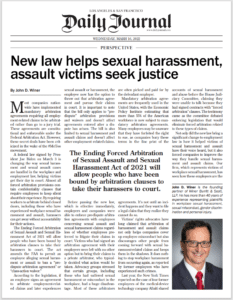Most companies nationwide have implemented mandatory arbitration agreements, requiring all employment-related claims to be arbitrated rather than go to a jury trial. Mandatory arbitration agreements are constitutional and enforceable under the Federal Arbitration Act (FAA). However, these secret deals have been criticized in light of the #MeToo movement. A new federal law that was recently signed is now changing how sexual harassment and sexual assault cases are handled in the workplace and employment law, helping victims get their day in court.
H.R. 4445, also known as the “Ending Forced Arbitration of Sexual Assault and Sexual Harassment Act of 2021,” will allow people whose arbitration clauses have bound to take their harassers to court. H.R. 4445 amends the FAA to permit an employee alleging sexual harassment or assault to ban a “pre-dispute arbitration agreement” or “class-action waiver.”
According to the legislation, if an employee signs an agreement to arbitrate employment-related claims and later experiences sexual assault or harassment, they can now throw out that arbitration agreement and pursue their claims in court. It is important to note that the bill only applies to “pre-dispute” arbitration provisions and waivers and doesn’t affect agreements entered after a dispute has arisen. The legislation is also limited to sexual harassment and assault claims and doesn’t affect other employment-related claims.
Before passing H.R 4445, employers and companies could enforce pre-dispute arbitration agreements with employees concerning sexual assault and sexual harassment claims regardless of whether employees preferred to litigate their claims in court. Victims who had signed an arbitration agreement with their employers were left with no other option but to bring their claims to a private arbitrator, who decided what action would be taken. Advocacy groups stressed that this would be a considerable disadvantage since most arbitrators are picked and paid for by the defendant.
Victims’ rights advocates have long claimed that arbitration of harassment and assault claims helps companies cover up employee misconduct, discourages other people from coming forward with sexual harassment-related claims, and keeps them in the shadows. It also does nothing to stop the issue of workplace harassment from occurring again, as reported by former employees who have experienced such crimes. Last year, the New York Times reported on the case of four former employees of the medical-device technology company Afiniti. The employees shared their sexual harassment and abuse claims before the House Judiciary Committee, arguing they couldn’t talk because they had signed contracts with “forced arbitration” clauses. The testimony came as the Committee debated enforcing legislation that would eliminate forced arbitration related to these types of claims.
The legislation brought a significant change to employment law in how it helped victims of sexual harassment and assault have their voices heard. It also forced companies to improve how they handle sexual harassment and assault claims. Our firm has seen how these employers are the only ones that benefit from forced arbitration clauses and when it comes to matters of sexual harassment and assault, employees should not be the ones paying the price by being silenced.
The idea that arbitrations are more time and cost-effective than jury trials has turned out to be false. It regularly takes more time to complete an arbitration than a civil jury trial, and it takes longer from the date of filing for arbitration to begin rather than a trial. Most attorneys have had cases where the arbitration can drag out for over a year, and arbitrators delay making awards. We may see an influx of sexual harassment-related lawsuits in the coming months, and we look forward to seeing what other changes this legislation will bring to employment law.

